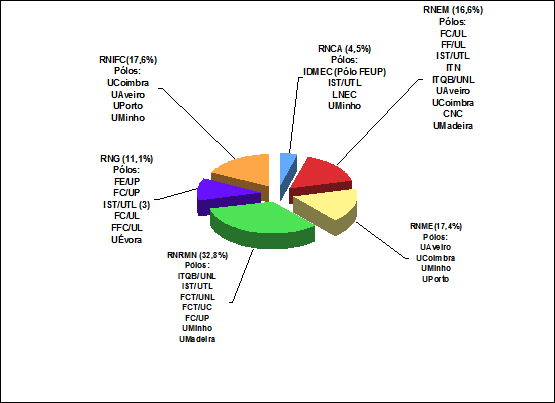National Programme for Scientific Equipment Renewal
National Networks
The National Networks of Scientific Equipment are service infrastructures, open to the scientific community and based on management models pertaining to contracts established between FCT and host institutions responsible for initial applications. Notwithstanding the fact that these institutions are the recipients of the equipment, FCT has the right to verify the conditions under which they are used, namely, the maximization of the use and access to the scientific community. It is important that these conditions and its verification is maintained beyond the period stated in the Network contracts.
Based on the recommendations of the evaluation panels and knowledge of the needs and capabilities of the various national institutions, six networks were defined, namely Nuclear Magnetic Resonance (RNRMN), Mass Spectrometry (RNEM), Electron Microscopy (RNME), Advanced Computing (RNCA), Functional Cerebral Imagiology (RNIFC), and Geophysics (RNG) National Networks.
The location and characteristics of the equipment to be purchased was agreed upon with the Principal Investigators responsible for applications, and the distribution of funding between the institutions that integrate each network was also determined. The overall funding awarded to these networks was 19.8 M €.

Distribution, by Network, of the total funding attributed to the RNECs and identification of their poles.
In 2006/2007, the final phase of the acquisition and installation of equipment, the Principal Investigators of hosting institutions in collaboration with FCT Infrastructures group, developed the Collaboration Protocols and Management Models that govern its operation.
The proposal for the creation of each of the networks foresaw the establishment of a Pluriannual Programme Contract with its institutions and later members, according to the equipment of each network and the services provided therein.
Under the Pluriannual Programme Contract funding costs associated with the operation of the network as an open service to all the scientific community were defined, and the corresponding institutional obligations established.
Four Pluriannual Programme Contracts were signed with the following National Networks:
- Mass Spectrometry (RNEM);
- Electron Microscopy (RNME);
- Nuclear Magnetic Resonance (RNRMN);
- Functional Brain Imaging (RNIFC).